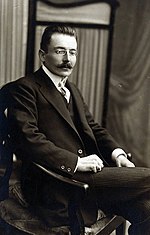About Ludovic Dauș
- Ludovic Dau? (October 1 [O.S.
- September 19] 1873 – November 17, 1954) was a Romanian novelist, playwright, poet and translator, also known for his contributions as a politician and theatrical manager.
- He was born into a cosmopolitan family, with a Czech father and a boyaress mother, but his formative years were marked by life in the small boroughs of Western Moldavia.
- Trained as a lawyer and employed for a while as a publisher, Dau? joined the body of experts at the Ministry of Royal Domains, climbing through the bureaucratic ranks.
- In parallel, he advanced his literary career: a noted dramatist, he was an unremarked poet and historical novelist prior to World War I.
- His translation work covered several languages, and includes Romanian versions of The Kreutzer Sonata, Madame Bovary, and Eugénie Grandet. After being welcomed into the literary salon headed by Bogdan Petriceicu Hasdeu, Dau? moved between literary clubs.
- By 1918, he had adopted a Romanian nationalist discourse in his poetry and, increasingly, in his political career.
- He had several new commissions in Greater Romania, and in particular Bessarabia, where he is remembered as the first chairman of Chi?inau National Theater.
- Dau? went on to serve in the Assembly of Deputies and Senate, where he affirmed the interests of Bessarabian peasants and advocated radical land reform; initially a member of the local Independent Party, he later caucused with the National Liberals. During the interwar, Dau? was also loosely affiliated with the modernist circle Sburatorul.
- He matured as a writer, earning praise and drawing controversy with works of political fiction which bridged a neo-romantic subject matter with elements of the psychological novel; he also shocked theatergoers with his explicit play about Vlad ?epe?.
- He continued to work for the stage during World War II, and was briefly a manager of Caragiale Theater, dying shortly after the inauguration a communist regime.
Read more at Wikipedia
See Also
- Famous People's Birthdays on 19 September, Romania
- Famous People's Birthdays in September, Romania
- Famous lawyer's Birthdays on 19 September, Romania
- Famous lawyer's Birthdays in September, Romania
- Famous poet's Birthdays on 19 September, Romania
- Famous poet's Birthdays in September, Romania
- Famous politician's Birthdays on 19 September, Romania
- Famous politician's Birthdays in September, Romania
- Famous translator's Birthdays on 19 September, Romania
- Famous translator's Birthdays in September, Romania


 Date of Birth:
Date of Birth:  Place of Birth: Botoșani, Botoșani County, Romania
Place of Birth: Botoșani, Botoșani County, Romania